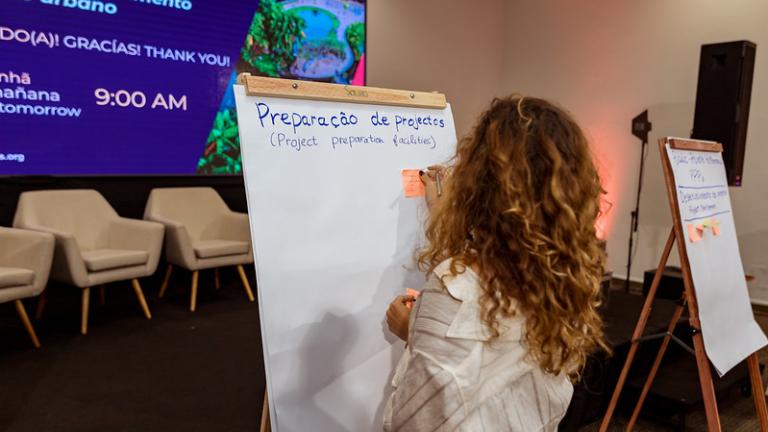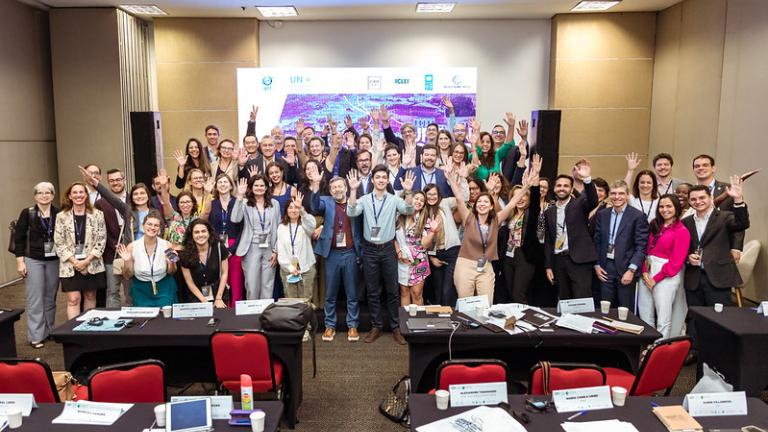Advocacy
UrbanShift at World Urban Forum: Scaling-up Financing for an Urban Shift towards Nature-Positive and Climate-Resilient Cities
Drawing from the experience of UrbanShift cities, this dynamic discussion focused on scaling up finance to strengthen SDG action in cities.
Climate change and biodiversity loss are global phenomena that largely impact urban life, generating a massive need for investments in climate action, as well as protection and restoration of biodiversity at the local level. However, the fundamental problem confronting most local authorities, especially those managing cities in developing countries, is that cities and regions today confront a global financial architecture designed largely by and for nation-states. Despite significant pledges to funds like the Green Climate Fund (GCF), the Least Developed Countries Fund, and the Special Climate Change Fund at COP28, as well as the launch of the Council of the GBF Fund (GBFF) at the seventh GEF Assembly, these funds remain difficult to access for subnational governments. Furthermore, city-oriented programs for local and subnational governments to access international finance, such as the EBRD’s Green Cities Program and the GEF Sustainable Cities Impact Programme, remain limited and could be further expanded.
National governments can play a significant role in creating the enabling conditions and securing a steady flow of financing towards sustainable urban development. This can be done by developing an overarching strategy to deliver shared prosperity while reaching net-zero emissions, and placing cities at its heart. This would guide all line ministries to incorporate urban development into their approach and de-risk low-carbon investment by providing clear signals to private actors. National governments can also set up mechanisms to fund sustainable urban infrastructure or seek international financing to support sustainable urbanization. Examples include placing cities at the heart of enhanced Nationally Determined Contributions from 2020 to 2025 and ensuring that all international development assistance is aligned with national urban strategies compatible with the Paris Agreement and the 2030 Agenda for Sustainable Development.
This partner-led event highlighted the the need for scaling up financing for the localization of the SDGs and other global environmental goals, by drawing on the experiences from UrbanShift cities, countries and partners, and the recommendations of the Urban SDG Finance Commission. It will more specifically explore how national governments can unlock financing for local governments to implement sustainability activities.
Building on the findings of the UNDSN Global Commission for Urban SDG Finance, the first part of the session set the scene and outlined key challenges cities face in financing their sustainable transition and how national governments and the international community can help increase financing streams towards cities. A panel discussion followed, featuring local and national government representatives, and partners from the UrbanShift network who shared their experiences and recommendations. Audience members then were invited to share their own reflections and ideas.
Speakers
- Rogier Van den Berg, Global Director for WRI Ross Center for Sustainable Cities
- Yvonne Aki-Sawyerr OBE, Mayor, Freetown, Sierra Leone
- Elizabeth Mrema, Deputy Executive Director, UN Environment Programme
- Cecilia Kinuthia-Njenga, Director, Intergovernmental Support and Collective Progress Division, UNFCCC
- Hélène Chartier, Director of Urban Planning and Design, C40 Cities
- Adalberto Maluf, National Secretary for Urban Environment and Environmental Quality of Brazil
- Sebástián Ferman, Secretary of Environment and Development, Argentina.
- Ms. Maryke van Staden, Director, Bonn Center for Local Climate Action and Reporting (carbonn Climate Center), ICLEI
- Xueman Wang, Senior Urban Specialist and Program Manager, Global Platform for Sustainable Cities, World Bank
- Rafael Tuts, Director, Global Solutions Division, UN-Habitat
- Aloke Barnwal, Coordinator, Sustainable Cities Program, Secretariat of the Global Environment Facility

Sustainable Finance Action and Advocacy: A Roadmap for Global South Cities
This C40-led webinar, held alongside 4th International Conference on Financing for Development (FfD4), aimed to equip mayors with the tools they need to advocate for expanded and accelerated access to urban climate finance.

UNEA-7 Cities and Regions Summit
Hosted in the lead-up to UNEA-7, this Summit will unite subnational leaders to strengthen collaboration and amplify the importance of cities.

Unlocking Subnational Finance for Green Sectorial Transformation: A Focus on Buildings & Cooling
Hosted during COP30 in Belém, Brazil, these dynamic panel discussions will explore strategies for enhancing access to transformative finance, and how these resources can support local climate transitions.

UrbanShift Looks Back: On the Value of Expanding Access to Urban Climate Finance
C40's Jessy Appavoo, ICLEI's André Almeida da Vila, and UNEP's Sharon Gil share why and how UrbanShift has prioritized support for cities to access climate finance.

